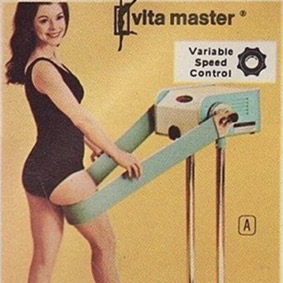I am skeptical of unsubstantiated hype. I do not recommend we eat differently, take a pill, or  exercise based upon faddish-trends. I was born in the 60’s, So I remember the infomercials for that space-suit jumpsuit being sold as exercise wear – so you’d “sweat off the pounds.” Yeah, it was a fad. Admittedly, if you enter my home you will see the “Vita-Master” on the porch‑—it is irony, I promise.
exercise based upon faddish-trends. I was born in the 60’s, So I remember the infomercials for that space-suit jumpsuit being sold as exercise wear – so you’d “sweat off the pounds.” Yeah, it was a fad. Admittedly, if you enter my home you will see the “Vita-Master” on the porch‑—it is irony, I promise.
Speed ahead to the present day trend toward headlines and research touring short bursts of interval-style exercise? I am all in, let me explain why.
I am from a family of marathon runners and could have easily fallen into the pattern of going for 30-60 minute runs and calling that great fitness. I wrote about the difference between continuous versus interval exercise here. It states how interval-style workouts improve performance and longevity and how you were born to do it. Three studies in the past week confirm why I have changed my fitness practices and recommend the same to others.
The older you are, the more interval style exercise will benefit your energy, performance and longevity. Long continuous exercise.
Three studies in late March 2017 confirm the need for intervals in your week.
Study #1 – New York Times Magazine subtitle reads, “Can certain kinds of exercise mitigate the effects of aging at the cellular level?”
This study does not merely show that interval exercise worked better to promote energy and longevity at a cellular genetic level, the outcomes worked best in older participants. Three exercises were compared: weight lifting, 30-minutes of continuous biking and Interval biking all using a stationary bike.
Want to mimic this type of workout? The effective group did the intervals three times per week—Four rotations of four minutes of hard biking alternates with three minutes of rest totaling about 30 minutes.
Study #2, Turns out 10,000 steps, or about 5-miles of walking, isn’t enough. Yeah, if you do gentle continuous activity it is GREAT to offset the damaging effects from too much sitting, but as for longevity, protection from heart disease and overall fitness? But this research states you may need 15,000 rather than 10,000 steps.
What if the long workout were running and not walking, would that be better?
Study #3 displayed the headline, “Marathon Running Tied to Short-Term Kidney Injury”. I look at blood test results on all my clients and the marathon runners do not look great: high triglycerides, elevated fasting blood sugars, stressed kidney markers. So many articles and studies have quoted that longer distance running shows diminishing returns after a certain point. I personally want an exercise practice to promote longevity and health, not just to add a sticker to the back of my car.
Since 15,000 steps takes nearly two hours, 30-minutes of intervals exercise a few days per week is undeniable efficient and doable. Whether it is through a circuit of exercises or just doing sessions that include those challenging things like Mountain Climbers: Our Metabolic Fitness Recovery Video has 6 minute circuits that can be repeated 2-3 times. This is the type of exercise I do in my life, I can’t ignore the science, and neither should you.




Comments are closed.